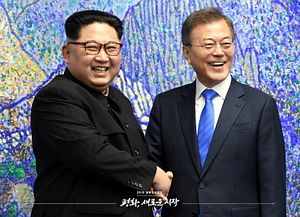In a phone call early on Wednesday morning, North Korea announced that it was cancelling its scheduled high-level talks with South Korea over ongoing U.S.-South Korea joint military exercises.
According to a statement carried in North Korea’s Korean Central News Agency (KCNA), the talks were canceled on account of the Max Thunder exercises, which the report described as a rehearsal for an invasion of the North. The South Korean Unification Ministry confirmed the meeting’s cancellation.
“This exercise targeting us, which is being carried out across South Korea, is a flagrant challenge to the Panmunjom Declaration and an intentional military provocation running counter to the positive development on the Korean Peninsula,” the KCNA news report noted.
“We have no choice but to suspend the North-South high-level talks planned for the 16th amid this menacing situation where an indiscriminate ruckus to invade the North and a confrontational mayhem are occurring in the South.”
The statement also included a mild threat that the upcoming June 12 summit between U.S. President Donald J. Trump and North Korean leader Kim Jong-un might be derailed.
“United States will also have to undertake careful deliberations about the fate of the planned North Korea-U.S. summit in light of this provocative military ruckus jointly conducted with the South Korean authorities,” the report noted.
North Korea has frequently criticized joint exercises by the United States and South Korea. In March, a high-level South Korean delegation, after its visit to Pyongyang, said that Kim Jong-un had communicated that he understood that military drills would have to go on between the allies.
“Our stance on the joint military drills is that it is hard to postpone the exercises again or suspend them and there is no justification for doing so. But Kim said that he understands the South’s stance,” an official from South Korea’s presidential office had told Yonhap News Agency at the time.
The ongoing Max Thunder exercises come a month after the alliance concluded its large-scale Foal Eagle and Key Resolve exercises. The exercises began on Monday and will run through May 25.
In a statement released by the U.S. Department of Defense, spokesperson Col. Rob Manning said that the exercises are “defensive” in nature and “are part of the [Republic of Korea]-U.S. Alliance’s routine, annual training program to maintain a foundation of military readiness.”
Last year, ahead of the start the U.S.-South Korea springtime exercises, North Korea conducted a ballistic missile launch exercise, firing four short-range ballistic missiles into the Sea of Japan.
The U.S. Department of State said that despite the threat and the cancellation of the inter-Korean meeting, the United States would continue planning for the June 12 summit meeting.
“We have not heard anything from that government or the government of South Korea to indicate we would not continue conducting these exercises or would not continue planning for our meeting between President Trump and Kim Jong-un next month,” State Department spokesperson Heather Nauert said at a news briefing on Tuesday.

































